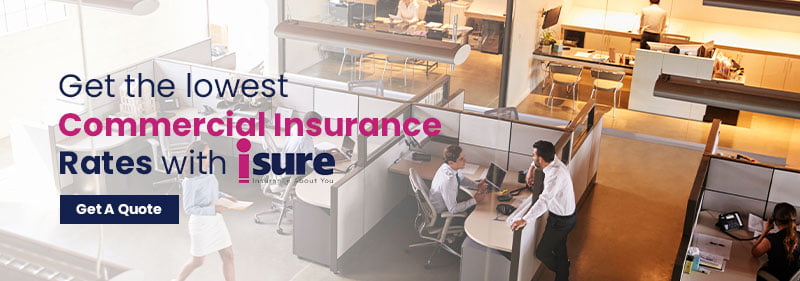In today’s business environment, the threat of litigation is a very real concern for business owners. Whether your valet damages a customer’s vehicle in the parking lot, accidentally hits a power line while performing repairs to the road or if one of your clients slips and falls while visiting your home office – each of these could result in a lawsuit against your business. Commercial General Liability (CGL) insurance protects your business when it is held liable for injuries or losses to third parties. To better understand what it covers and how much you need, here is the isure guide to CGL insurance.
What is CGL insurance?
Commercial General Liability insurance “protects you and your business against claims for bodily or personal injuries, advertising liability, as well as property damage to third parties arising from your operations or products or occurring on your business premises.” Coverage can be related to incidents that occur on your business premises or elsewhere, involving a physical injury, damage to property, or some kind of reputational harm. If a lawsuit is brought against you as a result, CGL insurance would cover legal costs to defend you and your business in court. It would also cover indemnity costs that cover damages to compensate third parties. In a nutshell, CGL insurance enables you to continue your normal operations while dealing with either real or fraudulent claims against your business.
Who needs CGL insurance?
If you are a business owner in Canada, you should have a commercial insurance policy as part of your business plan. Having general liability insurance will protect you from legal fees and damages. As a business owner, you come into contact with many third parties, including clients, vendors, and other businesses. Should they be involved in an accident or suffer a damage claim as a result of your business, you would be liable for their loss or damage.
Examples of some of the industries that should consider CGL coverage:
- Contractors
- Distributors and wholesalers
- Manufacturers
- Media & Entertainment
- Healthcare & allied professionals
- Professionals
- Tech companies
- Entrepreneurs
- Retail & E-commerce
What does Commercial Liability cover?
CGL insurance coverage is one of the most important insurance products for businesses. The negative impact that a lawsuit can have on your business has become a very real concern for owners.
Standard CGL policies include:
- Bodily injury liability: Injury as a result of your business operations. Should someone trip and fall in your home office, the cost of any legal damages and medical expenses would be covered.
- Property damage: If a third party holds you liable for property damage i.e. if an employee damages a customer’s car during valet service, it would cover legal fees and damages.
- Product liability: Bodily injury or property damage caused by a product you sold or supplied. If an appliance sold to a customer malfunctions and catches fire in their home, you would be covered.
- Legal costs: Protection against lawsuits and legal fees.
- Personal & advertising injury liability: Claims of slander, libel, privacy invasion, intellectual property infringement, or false advertising. If you posted a client’s renovated bathroom on your company’s social media account without consent, legal fees and compensation for damages would be covered by your policy.
A CGL certificate is often a requirement at different venues (eg. hotels, arenas, conference halls) for events such as trade shows, weddings or conferences.
What is not covered by Commercial General Liability insurance?
Commercial General Liability insurance does not typically provide coverage for:
- Contractual liability. There is no bodily injury or property damage coverage if you are held liable for damages you assumed the liability of another in a contract or agreement
- Intentional criminal acts
- Lost revenues if you have shut down
- Cyber-attacks or misuse of data
- Patent infringement
- Motor vehicles or automobiles (you need a Commercial Auto Insurance policy)
- Professional services or advice you provide (you need Professional Liability Insurance)
How much CGL coverage does my business need?
To ensure you receive the proper coverage, our isure brokers will ask you several questions about your business to better understand your needs. Several factors are taken into account when deciding on the best type of coverage for your business:
- The size of your business premises
- The condition of your business property and buildings
- The location of your business
- Your industry and type of business operations
- The number of years you’ve been in business
- The number of workers you employ
- Your business claims history
Other factors affect how much you’ll pay for CGL insurance, including the coverage limits of your policy. The higher your maximum limit, the more you’ll pay. The size of your deductible will also affect the amount you pay on insurance premiums, and if you have a higher deductible, your premiums will be lower. Just make sure your deductible is an amount your business can cover if the need arises.
How can I prevent a Commercial General Liability insurance claim?
The best way to shield yourself from litigation is to have good commerce practices, such as:
- Mindful marketing: Be clear with what you say and post online about clients and competitors, otherwise you are opening yourself up to a libel or slander suit.
- Copyright caution: Make sure you do not infringe on another business’ licensed content.
- Devil in the details: Set time aside to go through documentation sent to clients and go over all content to be released for advertising purposes.
- Handle with care: Take pride in your work and exercise care when handling and storing customers’ property.
- Safety first: Follow all safety standards in your industry to minimize risks.
FAQs about CGL insurance
What is Umbrella Liability insurance?
Commercial Umbrella Liability insurance provides your business with additional liability coverage over and above your CGL insurance policy. This additional coverage is to ensure you don’t have to pay for liability claims out-of-pocket if they exceed the coverage limits of your primary policy.
What is the difference between CGL and Errors and Omissions insurance?
Commercial General Liability insurance covers third-party property damage or bodily injury, whereas Errors and Omissions Insurance covers lawsuits alleging neglect, misconduct, or failure to deliver advice or services as promised. Together, they form a comprehensive insurance policy package.
Who is considered a “third party”?
As a business owner, any “third parties” may include clients, vendors, and other businesses who may be involved in an accident or claim against your business. This definition of a third party does not include your employees or sub-contractors for coverage purposes.
What is the difference between Public Liability insurance and CGL?
The primary difference between the two is the risks that they cover. Public Liability insurance provides financial coverage against the public’s claims against your business for personal injury or property damage, whereas CGL provides a more extensive range of coverage. This may include both personal and advertising injuries, as well as everything public liability insurance covers.
What’s the difference between General Liability insurance and Professional Liability insurance?
Both types of business insurance provide compensation for legal fees and damages if a third party decides to sue. However, General Liability insurance protects the business against claims of bodily injury and property damage while Professional Liability insurance protects the business against claims of errors and omissions from your professional services.
Is CGL insurance mandatory to have?
Commercial General Liability insurance is usually not mandatory unless a client requests for you to have it or your landlord requires it for you to lease a commercial space. However, your business (no matter how small) should consider CGL coverage because a single claim could cause a great financial burden to your business operations.
How do I get CGL insurance in Canada?
To purchase General Liability insurance as part of your business insurance package, contact one of our isure representatives to calculate the cost of your policy and to help guide you through making your purchase.
How much does Commercial General Liability Insurance cost?
For a small to medium-sized business, you can expect to spend around $450 annually on a basic Commercial General Liability insurance policy with a $2M limit.
Are there limits?
Yes, all types of policies have limits. Always consider your coverage limits when comparing costs before you purchase your plan.
Can I run my business without it?
Yes, but it is not advised. While you are not legally required to purchase CGL insurance protection, it can safeguard your company against lawsuits that could cripple your business or cause your business to close. Some types of businesses and practitioners may be required to carry insurance, and it would be essential to secure loans, create partnerships, and win contracts.
Does Commercial General Liability insurance cover property damage?
Yes. CGL protects if you, your business, or employees cause property damage to a third party BUT it does not provide protection for damage to your business location. This is covered under Commercial Property insurance.
Commercial General Liability insurance is an important tool in your business’ arsenal. To defend yourself against real or fraudulent claims made against you, you need the right coverage. The old saying, “Better to be safe than sorry” couldn’t be more applicable. Protect your life’s work and the livelihood of your business by purchasing CGL insurance protection by speaking to an isure representative today.





